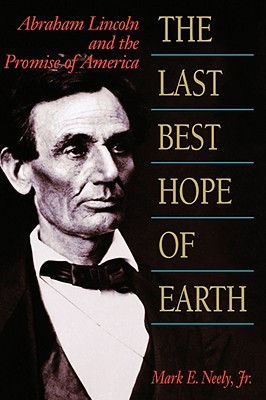It now appears that the safest way for scholars to treat Abraham Lincoln is in discrete segments of his life, leaving it to other, perhaps braver, souls to draw the appropriate conclusions. This means that, as in this book which focuses on the presidential years, modern Lincoln scholarship seems to miss the essence of the man in all his complexity. A man and his actions are of course inseparable, but the significance of the clues to Lincoln’s character that Mark Neely offers us seems to escape the author’s own recognition. For instance, Neely makes note of Lincoln’s Enlightenment-laden rationalism, so evident in his 1838 Young Men’s Lyceum address, but leaves the question as to what we may infer from the fact largely unexplored. Given the revolutionary zeal with which some of Lincoln’s later allies would prosecute his war of empire and Utopia, however, the connections beg to be made.
For all that, this book is over a century late; had it been made available to the disenfranchised and defeated Confederates of the Reconstruction South, doubtless much of the pain of losing their homes, their land, and their culture would have been eased by the knowledge that their fortunes had been entrusted to the “last best hope of earth.” And if Father Abraham’s current intellectual heirs, panting at the chance to proclaim democracy unto all the world, have their way, soon other peoples will have the experience of joy and peace that once so pervaded Dixie.
Perhaps the greatest flaw of Mark Neely’s biography is that it is a remarkably flat portrait of one of the most perplexing and talented men of any age. That is not to say, of course, that Lincoln was a great statesman. Robert Johannsen has shown, in his Lincoln, the South, and Slavery, just how much Lincoln manipulated the sharpest issue of his time for his own political benefit. The consequence, of course, was not just an ambitious lawyer in the catbird seat, but our bloodiest war. Neely’s words make the point:
It would be very difficult to characterize the Republican party as anything but a sectional party, offering nothing to the white South and, in the speeches of most party members, making political capital out of anti-southernism. Abraham Lincoln was a good Republican, and his ideal of nationalism looked forward to an American nation based entirely on northern free-soil principles.
Lincoln’s vagueness about the eventual “extinction” of slavery . . . was perhaps the most intellectually dishonest part of his platform. Neither he nor any other anti-Nebraska politician much wanted to deal with the question of race.
So Lincoln ran for President, said nothing to allay the fears of an already-alarmed South during the summer months of 1860, was elected, and found, to his surprise and dismay, that the South was prepared to take some of his more vocal supporters at their word. If limiting slavery was the key, as Lincoln said it was, to its eventual abolition, then even this would be too much. For slavery in the South was part of the larger cultural complex of Old Whig-Jeffersonian republicanism that insisted on the necessity of the agrarian life to shape the free, self-controlled, virtuous men so vital to the life of the Republic. If the agrarian life were threatened, this belief held, then the Old Republic would be in mortal danger. Lincoln was the focal point of that threat in I860; and, sure enough, time has proved that the men who bade a fond farewell to union were, in their analysis of the problem, essentially correct. Lincoln destroyed a cultural system upon which the finer points of the Old Republic depended, substituting in its stead the rationalistic cash nexus, the atomistic individual, and the imperial presidency.
In the process, the old concept of virtue as self-disciplined adherence to the ideals of the moral imagination, personified in General Robert E. Lee, gradually gave way to an aggressive new order of idyllic self-righteousness, in which virtue is pursued in the collective worship of an abstract, rootless humanity. We can detect the tones of this distorted piety in Lincoln’s Gettysburg Address and Second Inaugural. The results of these rhetorical morality binges are yet unfolding before our eyes in the daily paper. It was, of course, all done (and is still being done) in the name of democracy; and it is, as I have said, a great shame that Lincoln’s soothing words of secularized religiosity were not more widely known to the victims of his messianic largesse.
Lincoln was a master of many things. He was a good lawyer, a fine politician, and a resolute Commander-in-Chief. As his legacy to his countrymen, however, Abraham Lincoln left not just the honied vision of a Crolier-than-thou Progressivism, but the promise of a future Caesar who, in his pursuit of the main chance, would imitate his predecessor by stopping at nothing to win his place on a marble throne in Washington, D.C. Lincoln’s rhetoric guaranteed that, for as long as his Union of force continues, paeans will be sung to equality, varying in both tone and melody but growing ever more shrill. Those brilliant hightoned notes of immanentized eschatology, cloaked as they were in a Kentucky-fried coating of biblical prose, serve now, as they served then, as the rallying cry for every new generation of ignoramuses who seek with starry eyes to begin anew and who invoke the name—the now magical name—of Father Abraham.
[The Last Best Hope of Earth: Abraham Lincoln and the Promise of America, by Mark E. Neely, Jr. (Cambridge: Harvard University Press) 214 pp., $24.95]

Leave a Reply